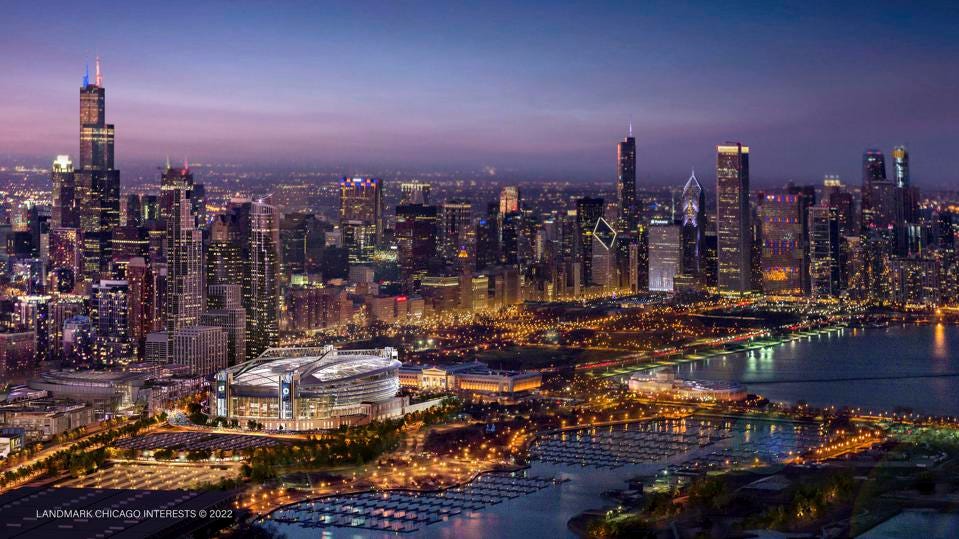Seemingly 20 years too late, the city of Chicago is throwing a Hail Mary pass designed to keep the Bears at Soldier Field, their home since 1971. The $2.2 proposal unveiled by Mayor Lori Lightfoot includes a plan to dome the lakefront stadium but seems unlikely to end the team’s interest in moving to the suburbs.
Bears Give Early Stiff-Arm To Lightfoot’s $2.2 Billion Plan To Add A Dome To Soldier Field

Looking to develop their own stadium project, the Bears reached an agreement in October 2021 to purchase the site of the Arlington International Racecourse from Churchill DownsCHDN -1.4% Inc. The 326-acre site in Arlington Park affords access by train and bus, plenty of room for parking, and space to build a state-of-the-art facility that could host the Super Bowl, the NCAA Final Four, and football championship games and other events, year-round.
The Bears must still arrange a financing package to build their dream stadium and are working to make the suburban project a reality.
“The only potential project the Chicago Bears are exploring for a new stadium development is Arlington Park,’’ the team said in a statement earlier this month. “As part of our mutual agreement with the seller of the property, we are not pursuing alternative stadium deals or sites, including renovations to Soldier Field, while under contract. We have informed the City of Chicago that we intend to honor our contractual commitments as we continue our due diligence and predevelopment activities on the Arlington Heights property.’’
Chicago invested $632 million in a renovation project in 2002-03 but it actually reduced the seating capacity of the stadium, which is the smallest in the NFL. It updated the interior of the stadium while attempting to keep the classic columns and other features on the outside.
There was little consideration to adding a roof to the facility in the 2002-03 renovation but Lightfoot said on Monday engineers have found a way to make one feasible.
“Hopefully, the Bears will see that there is an overwhelmingly compelling financial case for them to stay in Chicago, particularly given the delta between making an investment here at this stadium and what the costs are in today’s dollars on building a brand new stadium from scratch,” Lightfoot said. “It’s not even a close call, particularly when you think about the challenges of getting financing done in this state. (Soldier Field) is the answer to their problems, their concerns, their desire to maximize revenue, their desire to have a Tier 1 venue.”
Lightfoot, who will be on the ballot for re-election this year, is working to find ways to keep Soldier Field viable if the Bears do succeed in moving to the suburbs. She believes the city could still host major national events, including a Super Bowl, without being the team’s home.
Her plan would increase seating capacity from 61,500 to 70,000 while adding suites and six news clubs and “experiential areas.” It would allow the stadium to be more flexible for different events, converting into a multi-purpose venue that would be comfortable for events with a range of 5,000-60,000 people.
The city also has a plan for a more modest renovation that would improve the facility for the Major League Soccer’s Chicago Fire, concerts, and college football games. But the priority is finding a way to convince the Bears’ ownership to abort the Arlington Heights effort.